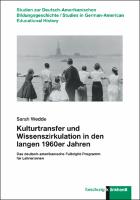Kulturtransfer und Wissenszirkulation in den langen 1960er Jahren
Das deutsch-amerikanische Fulbright-Programm für Lehrer:innen
Abstract
Cultural Transfer and Circulation of Knowledge in the long 1960s. The German-American Fulbright Program for teachers. The dissertation traces intercultural knowledge movements between West Germany and the United States in the long 1960s, initiated by the teacher exchange of the German-American Fulbright Program, focussing on everyday culture and the educational/professional context. For the first time, the Annual Exchange Teacher's Reports on Teaching Experiences in the United States, which are kept in the archives of the German-American Fulbright Commission in Berlin, will be evaluated alongside further sources on the institutionalization, design and operationalization of the German-American Fulbright Program. The reports were submitted as completed questionnaires and form the basis of the work as a serial source. They provide information on how German exchange teachers perceived and reflected on their stay in the USA and show which misconceptions were consolidated or overcome. At the same time, knowledge circulation can be traced, and exchange teachers can be identified as agents of a knowledge movement after World War II. The aim here is not so much to write a normative success story of a straightforward US culture transfer to West Germany. Rather, the focus is on the multi-layered, interwoven, and above all open-ended knowledge movements as part of the German-American educational and cultural transfer processes of the post-war period. The focus will be on the agents, networks, structures, and communication spaces within the German-American Fulbright Program in order to understand where, how, and by whom elements were reflected, selected, adapted, and reshaped or rejected. Thus, the transatlantic exchange encounters of Fulbright teachers indicate that cultural objects and patterns of action as well as societal values were adopted from the United States, thus creating a readiness for modernization through adaptations and reinterpretations. The Fulbright Program continued the German-American educational exchange, setting new accents which influenced developments in the Federal Republic of Germany after 1945, especially in education and everyday culture, while at the same time aiding German culture in its initial opening up to ‚Americanization‘. As a result, the exchange teachers contributed to the cultural transfer between the U.S. and the Federal Republic of Germany in the long 1960s. Kulturtransfer und Wissenszirkulation in den langen 1960er Jahren. Das deutsch-amerikanische Fulbright-Programm für Lehrer:innen. Die Dissertation zeichnet die interkulturellen Wissensbewegungen zwischen Westdeutschland und den USA in den langen 1960er Jahren im alltagskulturellen und schulisch-professionellen Kontext angestoßen durch den Lehrer:innenaustausch des deutsch-amerikanischen Fulbright- Programms nach. Erstmalig werden hierzu die Annual Exchange Teacher’s Reports on Teaching Experiences in the United States aus dem Archiv der deutsch-amerikanischen Fulbright-Kommission in Berlin ausgewertet und weitere Quellen zur Institutionalisierung, Ausgestaltung und Operationalisierung des deutsch-amerikanischen Fulbright-Programms herangezogen. Die Reports liegen in Form von Fragebögen vor und bilden als serielle Quelle die Grundlage der Arbeit. Sie geben Auskunft darüber, wie deutsche Austauschlehrer:innen ihre Erfahrungen während ihres USA-Aufenthalts wahrnahmen und reflektierten und welche ‚misconceptions‘ sich dabei verfestigten oder überwunden wurden. Gleichzeitig können zirkulierendes Wissen sowie Akteur:innen einer transatlantischen Wissensbewegung nach dem Zweiten Weltkrieg nachvollzogen werden. Hierbei geht es weniger darum, eine normative Erfolgsgeschichte für einen geradlinigen Transfer von Elementen US-amerikanischer Kultur(en) nach Westdeutschland zu schreiben. Vielmehr geht es um die vielschichtigen, in- und miteinander verwobenen und vor allem ergebnisoffenen Wissensbewegungen als Teil der deutsch-amerikanischen Bildungs- und Kulturtransferprozesse der Nachkriegszeit. Dabei werden die Akteur:innen, Netzwerke, Strukturen und Kommunikationsräume im Rahmen des deutsch-amerikanischen Fulbright-Programms fokussiert, um nachvollziehen zu können, wo, wie und durch wen Elemente reflektiert, selektiert, adaptiert und umgeformt oder auch abgelehnt wurden. So deuten die transatlantischen Austauschbegegnungen der Fulbright-Austauschlehrer:innen darauf hin, dass kulturelle Objekte und Handlungsmuster sowie gesellschaftliche Wertvorstellungen aus den USA übernommen wurden und durch Adaptionen und Umdeutungen eine Bereitschaft zur Modernisierung schafften. Das Fulbright-Programm schrieb den deutsch-amerikanischen Bildungsaustausch fort und setzte dabei neue Akzente, die die Entwicklungen in der BRD nach 1945 vor allem im Bildungswesen und der Alltagskultur beeinflussten und zugleich eine Öffnung zur ‚Amerikanisierung‘ ermöglichten. So trugen die Austauschlehrer:innen als Multiplikator:innen zum Kulturtransfer zwischen den USA und der BRD in den langen 1960er Jahren bei.
Keywords
Historische Bildungsforschung, Kulturtransfer, Fulbright, Fulbright-Programm, Reeducation, Reorientation, 1960er Jahre, Studentenaustausch, Geschichtsvermittlung, Historische Pädagogik, Geschichtsdarstellung, Zeitgeschichte, Bildungsgeschichte, Geschichtsbewusstsein, Historisches Denken, Geschichtsbild, GeschichtskulturDOI
10.35468/6013ISBN
9783781525719, 9783781560130Publisher
Verlag Julius KlinkhardtPublication date and place
Bad Heilbrunn, 2023Grantor
Series
Studien zur Deutsch-Amerikanischen Bildungsgeschichte / Studies in German-American Educational History,Classification
Education


 Download
Download Web Shop
Web Shop